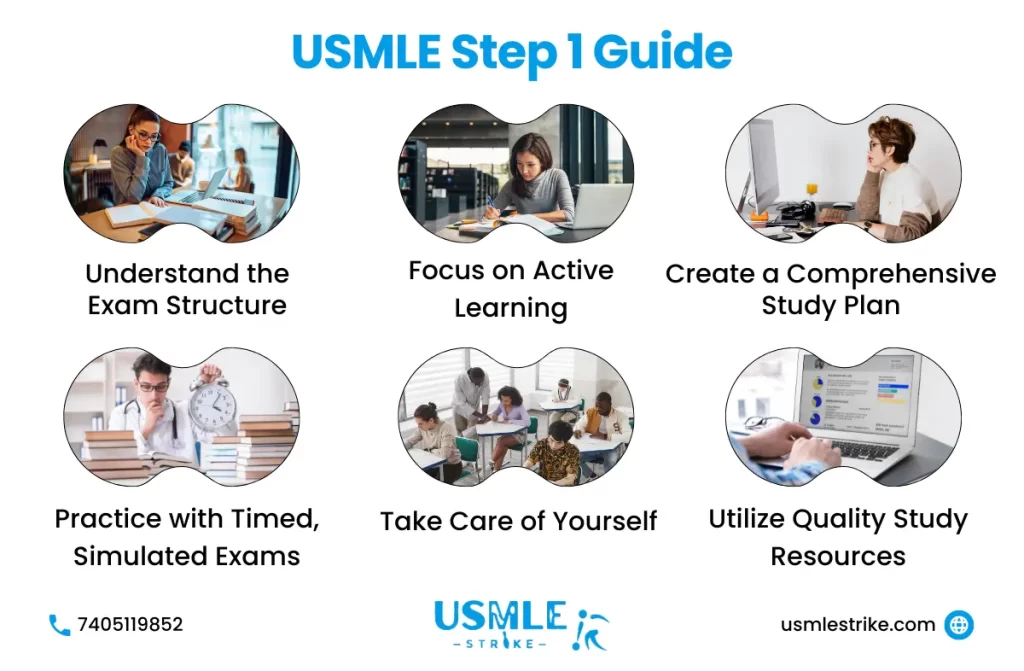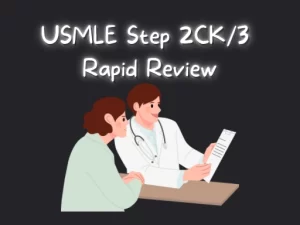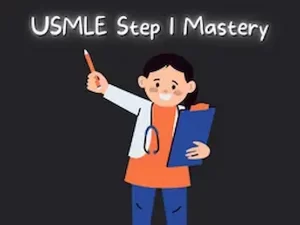Embarking on the USMLE Step 1 study guide journey requires strategic preparation and an effective study plan. In this comprehensive guide, we’ll delve into the best study assessments to help you succeed on the USMLE Step 1. Whether you’re a medical student or an international medical graduate, this guide aims to provide valuable insights to enhance your preparation.
Structuring Study Schedules
Creating an effective study schedule is crucial for acing the USMLE Step 1. A well-organized schedule not only helps in covering all the essential topics but also allows time for review and practice. Here’s how to structure your study schedule:
- Prioritize High-Yield Topics: Focus on subjects that carry more weight in the exam, such as Physiology, Pathology, and Pharmacology. Make sure to allocate more time to these areas.
- Set Clear Goals: Break down your study plan into weekly or daily goals. This helps keep your progress on track and ensures that you cover every topic within your timeline.
- Incorporate Review Sessions: Regularly review previously covered material. This reinforces your knowledge and helps in retaining information.
- Use Active Learning Techniques: Engage with the material by using flashcards, practice questions, and teaching the material to others. This makes your study sessions more effective.
- Include Rest Days: Schedule breaks and rest days to avoid burnout. A well-rested mind is more productive and better at retaining information.
- Adjust as Needed: Your initial plan may need adjustments as you progress. Be flexible and ready to modify your schedule based on your performance in practice tests and comfort with the material.
What Subjects are Covered in USMLE Step 1?
The USMLE Step 1 Exam evaluates your understanding of basic medical sciences, focusing on the following subjects:
- Anatomy: Includes both gross and microscopic anatomy relevant to clinical practice.
- Physiology: Emphasizes key functions of the body’s systems and mechanisms.
- Biochemistry & Molecular Biology: Tests your understanding of metabolism, genetics, and molecular processes.
- Pharmacology: Assesses your knowledge of drug mechanisms, side effects, and clinical use.
- Pathology: Focuses on disease processes, including causes, mechanisms, and outcomes.
- Microbiology: Covers infectious agents, their mechanisms, and treatments.
- Behavioral Sciences: Includes topics on patient-doctor communication, ethics, and mental health.
The USMLE Step 1 preparation guide should ensure balanced coverage of these subjects with a focus on high-yield areas.

Best Resources for USMLE Step 1
In addition to review books, other resources can aid your preparation:
- USMLEStrike Qbank: Provides realistic, high-yield questions with detailed explanations and performance tracking, perfect for targeted USMLE Step 1 preparation.
- Anki Flashcards: Effective for spaced repetition and active recall, particularly for memorization-heavy areas like microbiology and pharmacology.
- Lecturio: Comprehensive video lectures and practice questions specifically designed for USMLE Step 1 coverage.
- Picmonic: A visual learning tool using mnemonics to help you remember complex medical concepts more effectively.
- UWorld: Offers detailed explanations for each answer, ideal for both practice and understanding.
- USMLE-Rx: Created by First Aid’s authors, USMLE-Rx provides deeper insights into First Aid topics, reinforcing your study.
Using a combination of these resources will strengthen your USMLE Step 1 study guide and increase your chances of success.
How to Study for Step 1: Pre-Dedicated & Dedicated Study Schedule
Dividing your preparation into pre-dedicated and dedicated study phases is a smart strategy for the USMLE Step 1 study guide. Here’s how to approach each phase:
Pre-Dedicated Study Schedule:
- Months 1-3:
- Foundation Building: Focus on core medical concepts, using your curriculum to review subjects like anatomy, biochemistry, and pathology.
- Practice Questions: Integrate Step 1 question banks into your daily routine, answering 10-20 questions a day.
- Active Review: Continuously revise high-yield topics to strengthen your foundational knowledge.
Dedicated Study Schedule:
- Months 4-6:
- Focused Study: Shift focus to high-yield review books like First Aid for USMLE Step 1 Exam Guide and intensive question bank usage.
- Daily Questions: Aim to complete 60-80 questions daily from a trusted USMLE Step 1 Exam study guide.
- Simulated Exams: Take at least two full-length practice exams during this phase to evaluate readiness and manage test anxiety.
USMLE Step 1 Prep Strategies
When it comes to USMLE Step 1 preparation, it’s essential to follow a structured and disciplined approach. Here are some proven prep strategies:
- Start Early: Begin your USMLE Step 1 Exam study guide preparation at least six months before your test date to allow ample time for in-depth learning.
- Use a Question Bank: Utilize the best USMLE Step 1 study guide resources, such as question banks like UWorld or USMLEStrike, to familiarize yourself with the exam format and test your knowledge.
- Active Recall & Spaced Repetition: Use active recall and spaced repetition techniques to enhance long-term retention of concepts.
- Review High-Yield Topics: Focus on high-yield topics frequently tested on the USMLE Step 1 Exam such as pathology, pharmacology, and physiology.
- Practice Full-Length Tests: Regularly take full-length practice exams to build endurance and confidence.
Your USMLE Step 1 preparation guide should emphasize regular review sessions and assessments to track progress.
USMLE Exam Structure
The USMLE Step 1 assesses your understanding of basic science concepts, including anatomy, physiology, biochemistry, pathology, pharmacology, microbiology, and behavioral sciences. Here’s a breakdown of the exam:
- Format: Computer-based test
- Questions: Around 280 multiple-choice questions
- Sections: Divided into seven blocks (each block contains 40 questions)
- Duration: 8 hours (including breaks)
- Question Types: Single best answer, clinical vignettes, and matching questions
- Pass/Fail: Scored on a pass/fail basis
Preparing for this exam requires a structured approach with a well-organized USMLE Step 1 study guide that aligns with your learning style.
USMLE Step 1 Review Titles
Using high-quality review books is vital for your success. Here are some of the most recommended titles:
- USMLEStrike: A dynamic study resource offering personalized study plans, detailed practice questions, and explanations to enhance learning and exam preparation, making it a valuable addition to your study toolkit.
- First Aid for the USMLE Step 1: Considered the Bible of Step 1 preparation, this book provides comprehensive high-yield topics and concise explanations.
- Pathoma by Dr. Sattar: An excellent resource for pathology with clear concepts and great video support.
- Boards & Beyond: Ideal for students seeking detailed explanations across various Step 1 subjects.
- Kaplan Lecture Notes: Kaplan’s comprehensive series, covering all subjects, is a great choice for deep dives into content areas.
- Sketchy Medical: This visual learning tool helps with memorizing microbiology, pharmacology, and pathology concepts.
These resources, including USMLEStrike, are the cornerstone of a solid USMLE Step 1 Study Guide, making them indispensable for any serious student.
Sample Study Guide for USMLE Step 1
Here’s a sample 3-month study guide for USMLE Step 1:
| Week | Focus | Resources | Daily Tasks |
| 1-4 | General Review | First Aid, Pathoma, UWorld | Study 6-8 hours/day 40 UWorld questions First Aid reading Pathoma chapters Anki flashcards |
| 5-8 | Intensive Pathology & Physiology | Pathoma, Boards & Beyond | Study 8-10 hours/day 60 UWorld questions Pathoma videos Physiology focus Anki flashcards |
| 9-10 | Pharmacology & Microbiology | Sketchy, UWorld | Study 8-10 hours/day 80 UWorld questions Sketchy Pharm/Micro First Aid review NBME self-assessment |
| 11-12 | Final Review | UWorld, NBME Exams | Study 10-12 hours/day 100 UWorld questions Full review of weak areas First Aid intensive read-through NBME practice exams |
USMLE Step 1 Pass/Fail Transition
With the introduction of the pass/fail system, students should shift focus from competitive scoring to mastering core medical concepts. Here’s how the change impacts your preparation:
- Focus Areas: Understanding basic sciences, integrating clinical knowledge, and critical thinking are paramount.
- Goal Setting: The aim is no longer a high numeric score but a strong grasp of subjects to build confidence for subsequent exams.
- Resource Selection: Choose materials that align with comprehension, like First Aid, Pathoma, and UWorld.
- Mental Health: Reduced pressure from competitive scoring enables better focus on long-term learning.
Planned Review of the USMLE Step 1 Passing Criteria
As part of regular operational procedures for licensing and certification exams, the passing standard for each Step exam undergoes a thorough review every three to four years. This ensures it aligns with the required level of content mastery essential for effective medical practice and licensure.
The 2024 review will incorporate insights from various sources, including:
- Recommendations from independent panels of physicians and educators convened in September and October 2024.
- Survey feedback from stakeholders such as state licensing representatives, residency directors, medical school faculty, and examinees regarding the appropriateness of the current standard.
- Data on examinee performance trends.
- Analysis of score precision and its impact on pass/fail determinations.
Any changes to the passing standard approved by the Committee will take effect for Step 1 examinees starting January 1, 2025. Updates and final decisions will be communicated through the USMLE website and the Bulletin of Information as the review progresses.
Conclusion
The USMLE Step 1 Exam Guide emphasizes the importance of a structured and disciplined approach to your preparation journey. By utilizing comprehensive resources, developing personalized study plans, and adhering to strategic scheduling, you can maximize your readiness for this critical milestone. Remember, consistent effort and the right mindset are key to confidently tackling the USMLE Step 1 Exam Guide and setting the foundation for a thriving medical career.
Read also Best USMLE Step 1 Qbank





